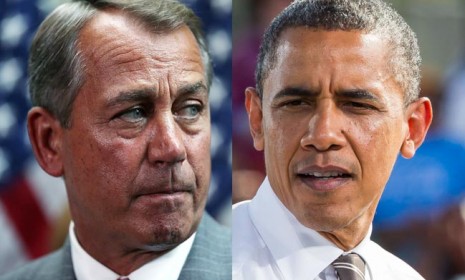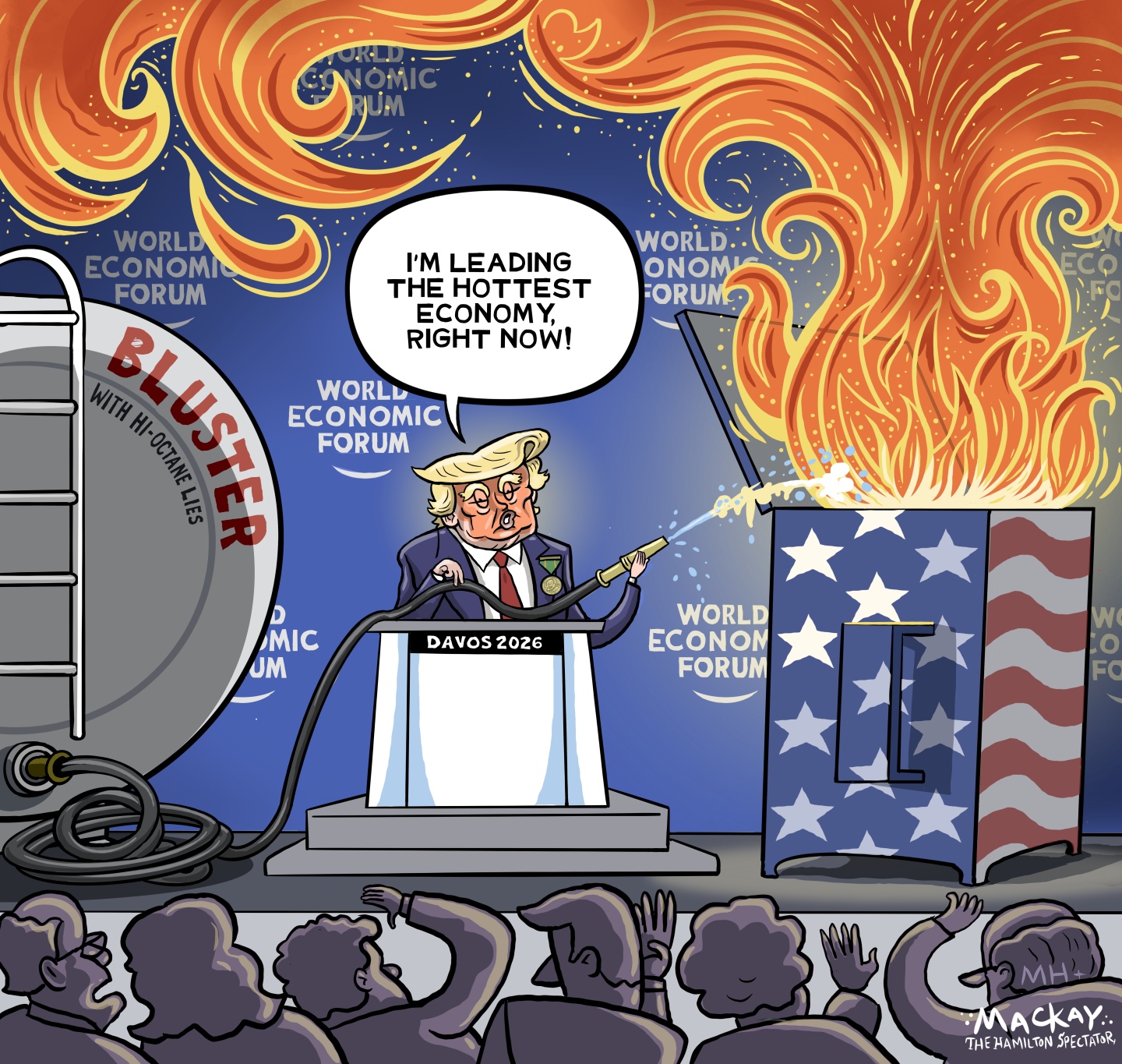Does President Obama have an advantage in the fiscal cliff battle?
A newly empowered Obama is heading into Round Two of budget talks with Speaker John Boehner

Unless Congress acts soon, two things will definitely happen on Jan. 1, 2013: The Bush tax cuts — totaling about $536 billion — will expire, and $110 billion in automatic spending cuts, sometimes referred to as sequestration, will go into effect. Known as the fiscal cliff, this frightening combination of tax hikes and spending cuts would probably act like a cardiac arrest on the recovery and push the economy back into recession. President Obama will soon begin negotiating with Speaker John Boehner over how to prevent such a scenario, a sequel to the budget talks for a "grand bargain" that collapsed in 2011. On the campaign trail, Obama said any deal must allow the Bush tax cuts to expire for those earning more than $250,000, and Democrats say the president's re-election is evidence that the country agrees. Boehner, meanwhile, has suggested that Republicans are "willing to accept new revenue under the right conditions," though that doesn't necessarily mean big tax hikes on the rich. Which side has an advantage at the negotiating table?
Obama has the advantage. The voters have spoken: "The question of whether high-end tax increases should be part of the country's fiscal solution was absolutely central to the presidential race for months," says Greg Sargent at The Washington Post. Obama underscored his position at every campaign appearance, every debate, and at the Dems' convention. "It does seem awfully clear that a majority of voters, in re-electing Obama, chose an approach to our fiscal problems that includes a bit more sacrifice from the wealthy — and rejected the argument that raising taxes on the rich will hurt the economy."
"Dems have leverage in 'fiscal cliff' talks"
The Week
Escape your echo chamber. Get the facts behind the news, plus analysis from multiple perspectives.

Sign up for The Week's Free Newsletters
From our morning news briefing to a weekly Good News Newsletter, get the best of The Week delivered directly to your inbox.
From our morning news briefing to a weekly Good News Newsletter, get the best of The Week delivered directly to your inbox.
And Republicans have a lot to lose: The last time Boehner and Obama tried to reach a grand bargain, the issue was whether the U.S. should raise the debt ceiling or default, says Jonathan Cohn at The New Republic. "Republicans were so opposed to spending they considered inaction the lesser of two evils," and Obama, "as a sitting president about to seek re-election, knew he'd bear political responsibility for the resulting economic damage" if we defaulted. This time, the "Republicans probably feel they have more to lose." The cuts "affect a wide variety of programs, but they hit defense spending particularly hard," and allowing the Bush tax cuts to expire is simply anathema to conservatives.
"How the election reset the 'fiscal cliff' debate"
Actually, the Tea Party has the real leverage: "Boehner is the undisputed leader of the Republican Party," says Dana Milbank at The Washington Post. "Pity him." While Boehner's "new tone was starkly different" from the total opposition that Republicans showed to Obama in the past, his "talk of common ground is likely to enrage the no-compromise wing of his House Republicans, who live in fear of the Tea Party, Grover Norquist, the Club for Growth, and other enforcers of conservative orthodoxy." Tea Party leaders do not see Obama winning a mandate on taxes: They "have convinced themselves that Romney lost because he wasn't conservative enough." Squeezed between Obama and the Tea Party, Boehner may very well see conservatives as the greatest threat to his speakership.
"Republican leader Boehner may be ready to bargain"
A free daily email with the biggest news stories of the day – and the best features from TheWeek.com
-
 Political cartoons for January 25
Political cartoons for January 25Cartoons Sunday's political cartoons include a hot economy, A.I. wisdom, and more
-
 Le Pen back in the dock: the trial that’s shaking France
Le Pen back in the dock: the trial that’s shaking FranceIn the Spotlight Appealing her four-year conviction for embezzlement, the Rassemblement National leader faces an uncertain political future, whatever the result
-
 The doctors’ strikes
The doctors’ strikesThe Explainer Resident doctors working for NHS England are currently voting on whether to go out on strike again this year
-
 The billionaires’ wealth tax: a catastrophe for California?
The billionaires’ wealth tax: a catastrophe for California?Talking Point Peter Thiel and Larry Page preparing to change state residency
-
 Bari Weiss’ ‘60 Minutes’ scandal is about more than one report
Bari Weiss’ ‘60 Minutes’ scandal is about more than one reportIN THE SPOTLIGHT By blocking an approved segment on a controversial prison holding US deportees in El Salvador, the editor-in-chief of CBS News has become the main story
-
 Has Zohran Mamdani shown the Democrats how to win again?
Has Zohran Mamdani shown the Democrats how to win again?Today’s Big Question New York City mayoral election touted as victory for left-wing populists but moderate centrist wins elsewhere present more complex path for Democratic Party
-
 Millions turn out for anti-Trump ‘No Kings’ rallies
Millions turn out for anti-Trump ‘No Kings’ ralliesSpeed Read An estimated 7 million people participated, 2 million more than at the first ‘No Kings’ protest in June
-
 Ghislaine Maxwell: angling for a Trump pardon
Ghislaine Maxwell: angling for a Trump pardonTalking Point Convicted sex trafficker's testimony could shed new light on president's links to Jeffrey Epstein
-
 The last words and final moments of 40 presidents
The last words and final moments of 40 presidentsThe Explainer Some are eloquent quotes worthy of the holders of the highest office in the nation, and others... aren't
-
 The JFK files: the truth at last?
The JFK files: the truth at last?In The Spotlight More than 64,000 previously classified documents relating the 1963 assassination of John F. Kennedy have been released by the Trump administration
-
 'Seriously, not literally': how should the world take Donald Trump?
'Seriously, not literally': how should the world take Donald Trump?Today's big question White House rhetoric and reality look likely to become increasingly blurred